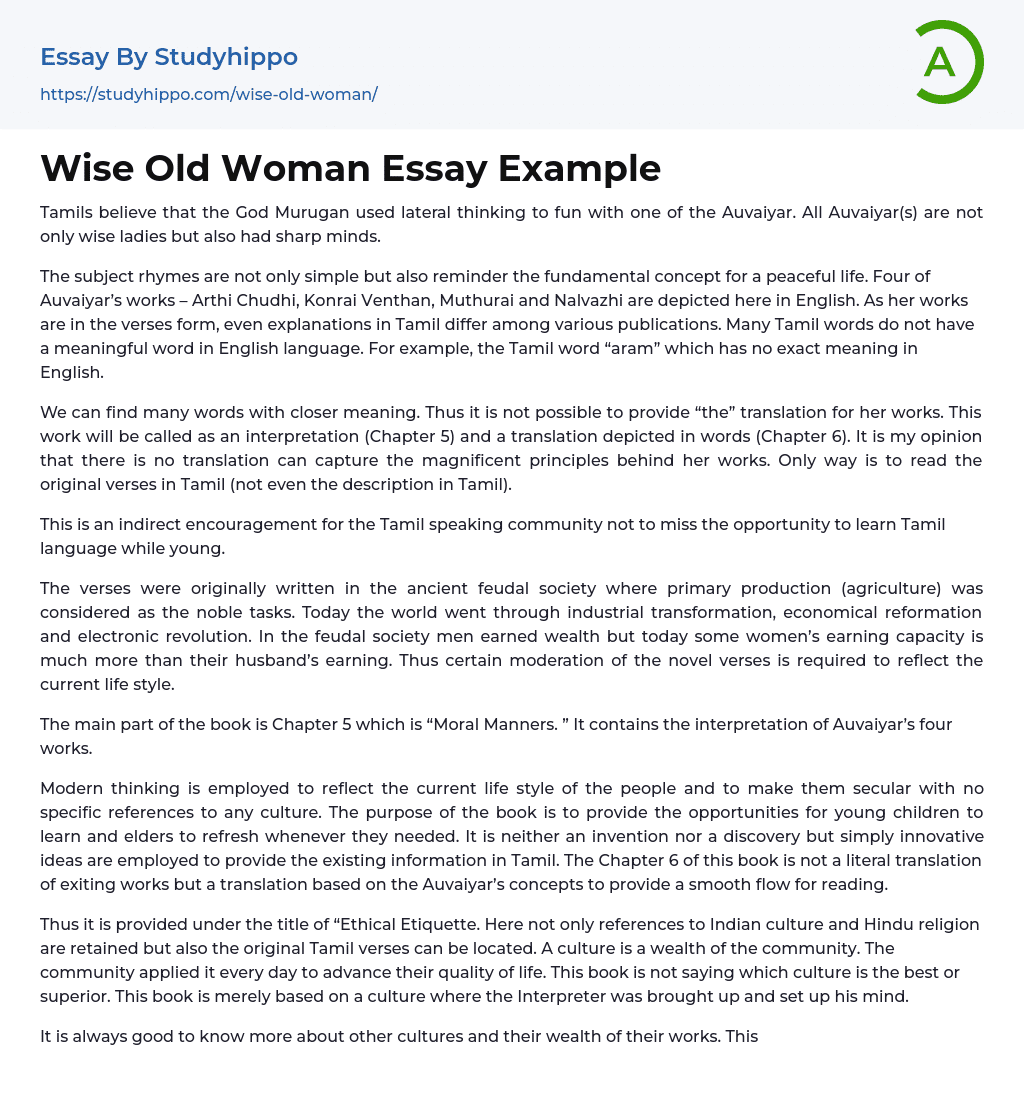Tamils believe that the God Murugan used lateral thinking to fun with one of the Auvaiyar. All Auvaiyar(s) are not only wise ladies but also had sharp minds.
The subject rhymes are not only simple but also reminder the fundamental concept for a peaceful life. Four of Auvaiyar’s works – Arthi Chudhi, Konrai Venthan, Muthurai and Nalvazhi are depicted here in English. As her works are in the verses form, even explanations in Tamil differ among various publications. Many Tamil words do not have a meaningful word in English language. For example, the Tamil word “aram” which has no exact meaning in English.
We can find many words with closer meaning. Thus it is not possible to provide “the” translation for her works. This work will be called as an interpretation (Chapter 5) and a translation depicted in words (
...Chapter 6). It is my opinion that there is no translation can capture the magnificent principles behind her works. Only way is to read the original verses in Tamil (not even the description in Tamil).
This is an indirect encouragement for the Tamil speaking community not to miss the opportunity to learn Tamil language while young.
The verses were originally written in the ancient feudal society where primary production (agriculture) was considered as the noble tasks. Today the world went through industrial transformation, economical reformation and electronic revolution. In the feudal society men earned wealth but today some women’s earning capacity is much more than their husband’s earning. Thus certain moderation of the novel verses is required to reflect the current life style.
The main part of the book is Chapter 5 which is “Mora
Manners. ” It contains the interpretation of Auvaiyar’s four works.
Modern thinking is employed to reflect the current life style of the people and to make them secular with no specific references to any culture. The purpose of the book is to provide the opportunities for young children to learn and elders to refresh whenever they needed. It is neither an invention nor a discovery but simply innovative ideas are employed to provide the existing information in Tamil. The Chapter 6 of this book is not a literal translation of exiting works but a translation based on the Auvaiyar’s concepts to provide a smooth flow for reading.
Thus it is provided under the title of “Ethical Etiquette. Here not only references to Indian culture and Hindu religion are retained but also the original Tamil verses can be located. A culture is a wealth of the community. The community applied it every day to advance their quality of life. This book is not saying which culture is the best or superior. This book is merely based on a culture where the Interpreter was brought up and set up his mind.
It is always good to know more about other cultures and their wealth of their works. This book is developed with providing assistance to overseas Tamil children whose first language in school is no more Tamil.
Some of them learn Tamil at home or from community. But there are many overseas Tamil students missed learning Tamil language.
This book is equally suitable for Tamils who learn Tamil as first language or as second language. This book is also developed to be used by any other Indian
Children whose mother tongue is not Tamil and all other children from English speaking world. The original Tamil verses are included for those who are competent in both languages.
- Age Of Enlightenment essays
- Ethos essays
- Time essays
- Acceptance essays
- Meaning Of Life essays
- Reality essays
- Natural Law essays
- Political Philosophy essays
- Utilitarianism essays
- Existence essays
- Free Will essays
- Good And Evil essays
- Confucianism essays
- Relativism essays
- Conscience essays
- Environmentalism essays
- Empiricism essays
- Epistemology essays
- Ethics essays
- Existentialism essays
- Human Nature essays
- Individualism essays
- Metaphysics essays
- Philosophy Of Life essays
- Transcendentalism essays
- Truth essays
- Destiny essays
- Determinism essays
- Fate essays
- Functionalism essays
- Philosophers essays
- Pragmatism essays
- Future essays
- Child Observation essays
- Critical Reflection essays
- Teaching Philosophy essays
- Personal Philosophy essays
- Action Speak Louder Than Words essays
- Can Money Buy Happiness essays
- Values of Life essays
- Ethical dilemma essays
- Normative Ethics essays
- Virtue Ethics essays
- Belief essays
- Deontology essays
- Moral essays
- Virtue essays
- Work Ethic essays
- Henry David Thoreau essays
- Carl Jung essays




